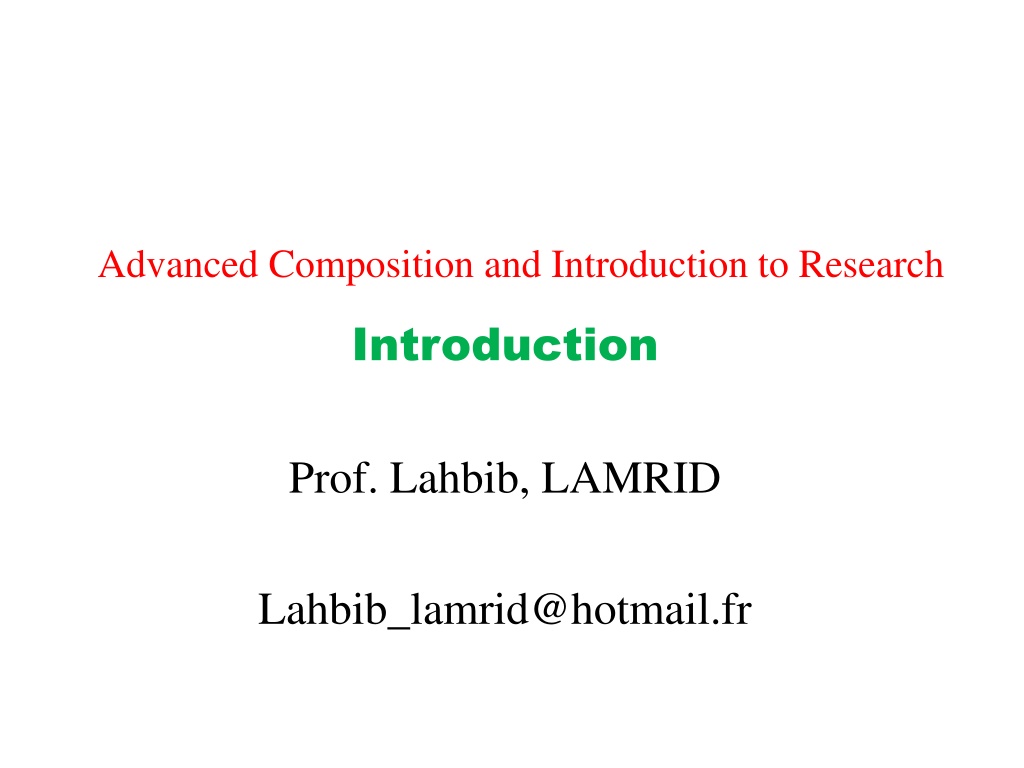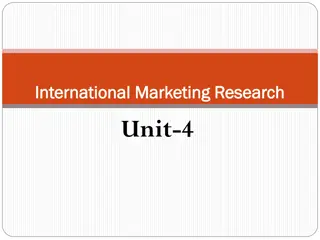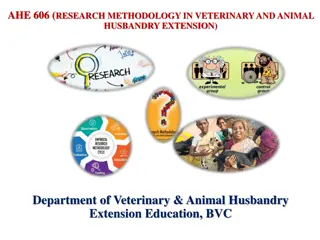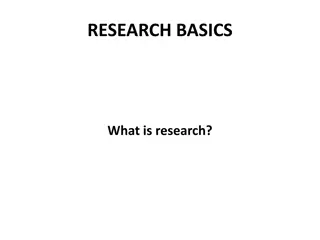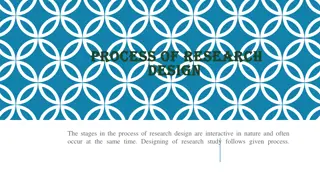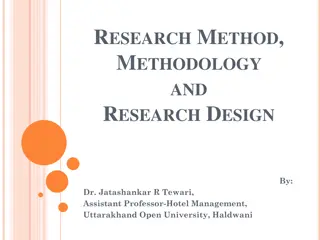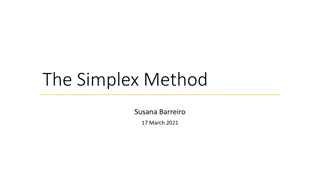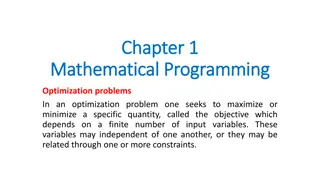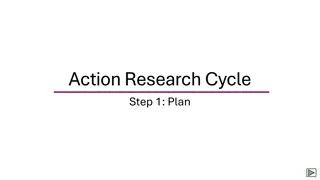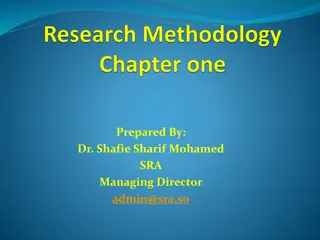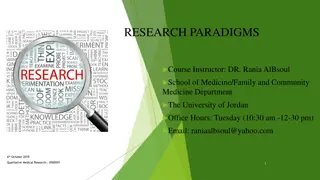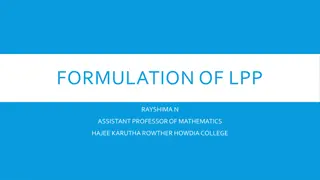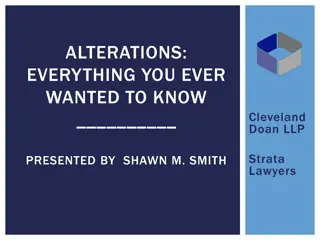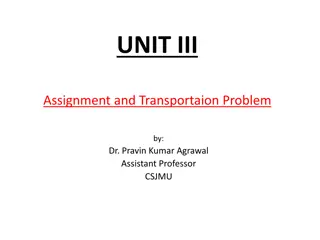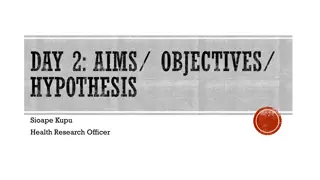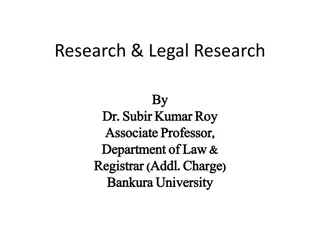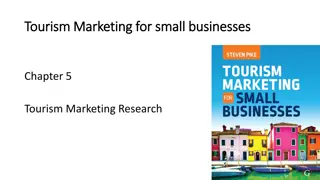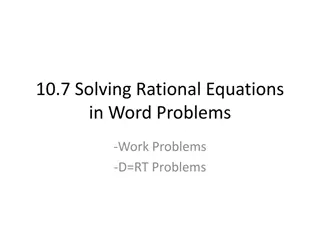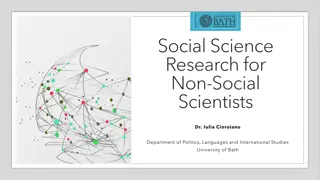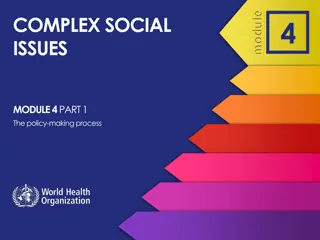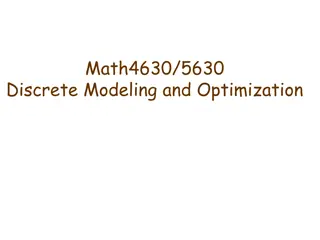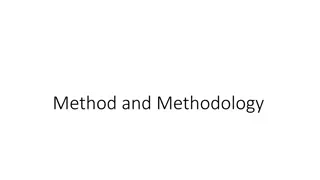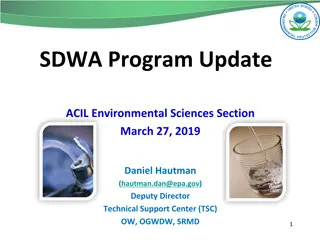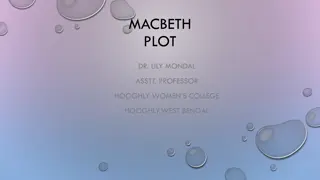Understanding Research: Importance and Common Problems Unveiled
Delve into the realm of research with insights on its importance, the vital steps involved, and common challenges faced today. Learn about the significance of choosing the right topic, collecting data, and presenting findings. Discover how research contributes to knowledge, practice, and policymaking, while also uncovering prevalent issues like unclear findings, data validity concerns, and the impact of poor documentation.
Download Presentation

Please find below an Image/Link to download the presentation.
The content on the website is provided AS IS for your information and personal use only. It may not be sold, licensed, or shared on other websites without obtaining consent from the author. Download presentation by click this link. If you encounter any issues during the download, it is possible that the publisher has removed the file from their server.
E N D
Presentation Transcript
Advanced Composition and Introduction to Research Introduction Prof. Lahbib, LAMRID Lahbib_lamrid@hotmail.fr
Advanced Composition and Introduction to Research Prof. Lahbib, LAMRID Lahbib_lamrid@hotmail.fr
To start a research, what is the first thing to begin with? Choosing a topic and settling on a research problem. Objective of today s session: By the end of the session, students will be able to choose a topic and research problem for their mini-research papers.
What is research? Research is about seeking a clarification for something, a solution to a problem, or an answer to a question. Not only that! Research is also about finding something new in a literary work and developing it. Research involves three major steps: 1- Posing a question or making a hypothesis; 2- Collecting data for answering the question or testing the hypotheses 3- Present an answer to the question or the results of testing the hypotheses
Why is research important? 1- Research adds to knowledge; 2- Research improves practice; 3- Research informs policy makers
What are the common problems with research today? Some of the problems are: 1- Unclear findings; 2- questionable or invalid data; 3- No limitations and delimitations; 4- Incomprehensive introductions; 5- Inconsistency; 6- poor reviews of literature; 7- Unclear headings; 8- Plagiarism; 9- Poor documentation of sources.
What are the types of research? Quantitative research Qualitative research Mixed methods research Literary research
Major steps of research In quantitative research: Choosing and research area of interest, topic, and problem ; Conducting an extensive review of related theories and literature; Collecting quantitative data; Analyzing data for results; Discussing results, giving conclusions, and offering recommendations.
In qualitative research Choosing a research area of interest, topic, and problem ; Conducting a sketchy review of related concepts and literature; Collecting qualitative data; Analyzing data for results; Discussing results, giving conclusions, and offering recommendations
In mixed methods research Choosing a research area of interest, topic, and problem ; Conducting an extensive or sketchy review of related concepts and literature; Collecting quantitative and qualitative data; Analyzing data for results; Discussing results, giving conclusions, and offering recommendations
In a literary research Finding a gap in a literary work; Conducting an extensive review of theories and literature; Analyzing and evaluating Discussing and presenting the new element(s)
Quantitative research Qualitative research Mixed methods Literary research research Research area and problem Research area and problem Research area and problem Research area and gap or problem Extensive literature review Sketchy literature review Lit. Review (extensive or sketchy) Extensive literature review Data analysis and results Data analysis and results Data analysis and results Analysis and evaluation discussion discussion discussion discussion
Which type of research do you think is most interesting? Why? What is major difference between the four types of research? What is the major similarity between the four types of research?
Choosing a research area/ topic and a research gap or problem Criteria for choosing a topic Appealing Enough sources Authoritative Criteria for choosing a problem It should pass the ROC test: Researchable; Original; Contributory.
Developing the research problem Research area Research topic Research problem
Examples Foreign language education in Morocco The teaching of French at primary school Students find learning French difficult
Food consumption in Morocco Consuming food during Ramadan Moroccan people waste a lot of food during Ramadan
THE MOST IMPORTANT THING IS: You need to make sure that your research problem passes the ROC testing that is to say, it is researchable, original, and contributory. Researchable: enough sources, population, audience, resonate background. Original: no one treated you before you Contributory: it is of value; it will benefit future research and policy makers.
Assignment Start working on your mini-research papers Write it in parallel with the advancement of the course But first, Choose a topic and a problem Review literature Students will present their papers in the 11thand 12th weeks of this semester.
Foreign language education in Morocco The teaching of French at primary school Students find learning French difficult
What is the next thing to do? Deciding on the type of research you want to conduct.
What are the major types of research? 1- Qualitative research 2- Quantitative research 3- Mixed methods research 4- Literary research
1- Qualitative research: 1.1. open-ended questions: Examples: (a) How do students learn foreign languages? (b)Why are minority groups so sensitive? 1.2. Always remember! - Qualitative research is concerned with the exploration of attitudes, opinions, perceptions, and feelings of the group/ groups under study. It explores a phenomenon.
2. Quantitative research 2.1. Hypotheses (yes or no) A hypothesis is a closed-ended question put in a statement form. Examples Closed- ended questions: Is there a difference between revising lessons in the evening and revising in the morning? Hypothesis: There is a difference between revising lessons in the evening and revising in the morning 2.1. Always remember! Quantitative research collects numerical data and describes it to accept or reject hypotheses
Important question to consider! What is the major shortcoming of the qualitative research and the quantitative one? - The qualitative research explores; - The quantitative research describes; Which means, They are both in need of each other for an in- depth study of a phenomenon .
Mixed method research 1. Quantitative-qualitative research Start with describing a phenomenon and then move to exploring it for the sake of elaboration: Quantitative-qualitative research Test statistics (describing statistical data in figures and table) - - Exploration Elaboration on previous findings Testing hypothesis Open-ended questions
Qualitative-quantitative research Start with exploring a phenomenon then move to describing it for further evidence. Qualitative-quantitative research 1 2 3 Collecting qualitative data (attitudes, perceptions, etc.) Quantitative data through closed- ended questions Answering the open-ended questions
Literary research It is like a prolonged book review or literature review; it reviews and evaluates a literary work or literary works for introducing and supporting a new thesis. Literary research Review and evaluate the work or works in light of the theories - Introduce your thesis (alternative) and defend it. Presenting the thesis In light of related theories
Practice: Choosing the research type Food consumption in Morocco Consuming food during Ramadan Moroccan people waste a lot of food during Ramadan Qualitative research: why do Moroccan people waste a lot of food during Ramadan?
What is the next step? Literature Review What is literature review? Summarize and evaluate previous theories and research Why is the literature review important? - identify research gaps/ weaknesses - underline the importance of the research problem - contextualize the research problem - building theoretical framework - formulating research hypotheses.
Formulating research hypotheses What is a research hypothesis? It is a self-evident truth. It is a prediction which you think is true to a great extent. What are the main types of hypotheses? 1. Null hypothesis 2. Alternative hypothesis How should we formulate hypothesis? Closed-ended questions put in statement forms
On what basis should hypotheses be formulated? Positivist basis: Research is external to truth, and s/he should seek it from respondents. S/he should formulate the hypotheses in a positivist way that is to say, in unbiased way. S/he should build the formulation of the hypotheses on a detailed and well-justified theoretical background.
Advanced Composition and Introduction to Research 4thSession 4thsemester Conducting the Review of Literature Prof. Lahbib LAMRID
By the end of this session, students will be able: (a)To summarize their research projects in one paragraph as a good start; (a)And to conduct the review of the literature for both quantitative and qualitative studies.
Choose a research topic and problem. Characteristics of a good research problem: 1- Focused; 2- Researchable/ manageable; 3- Original; 4- Contributory.
Types of Research/ Methodologies: 1- Quantitative Research; 2- Qualitative Research; 3- Mixed Methods Research; 4- Literary Research
Starting research with a clear idea Among the serious problems that face many students undertaking research projects is that they spend months, if not years, bouncing forth and back without having a clear idea about their projects. If a student does not have clear thoughts about his/ her research, the research journey turns to be full of anxiety, and it is doomed to failure. As much as it is a serious task, research is fun provided that the student starts it with clear thoughts. Students should start with summarizing their research projects in one clear and inclusive paragraph.
My research is on the possession of weapons by students in high schools in Oujda. It seeks to know the types of weapons possessed by students, the reasons for this phenomenon, and how school administrations deal with it. My research will be conducted in high schools in Oujda through observing and interviewing students. Teachers, parents, and school headmasters will be interviewed as well for further exploration of the problem. My research will have been completed by next May. Question 1: does the paragraph communicate understanding of the research project? How? Question 2: what question would the paragraph provide answers to ? clear
Questions to consider when summarizing your research in a paragraph as a good start! 1- What is my research (research topic and problem)? 2- Why do I want to do this research? 3- Who will be my respondents? 4- Where exactly am I going to conduct the study? 5- Which instruments will I use? 6- When will start and finish my research (timeline)?
In the light of these questions, summarize your research in a paragraph.
Conducting the Review of Literature Literature Review? A literature review is a critical written synthesis of journal articles, books, and other documents that describes the past and current state of information on the topic of your research study. It should contain information from various sources. It should also incorporate quantitative and qualitative studies. A literature review is not a collection of summaries of previous knowledge on the topic of your research study.
